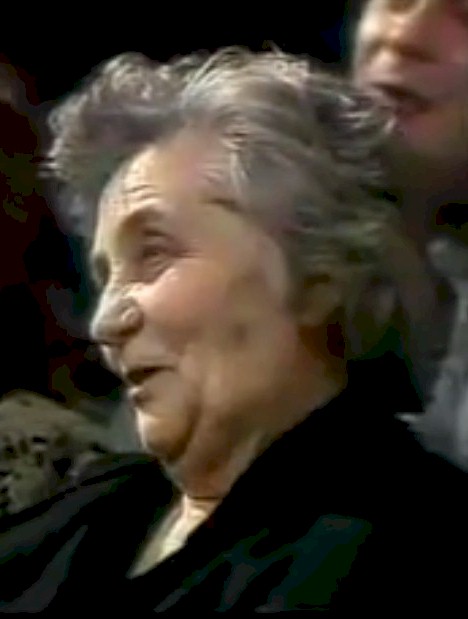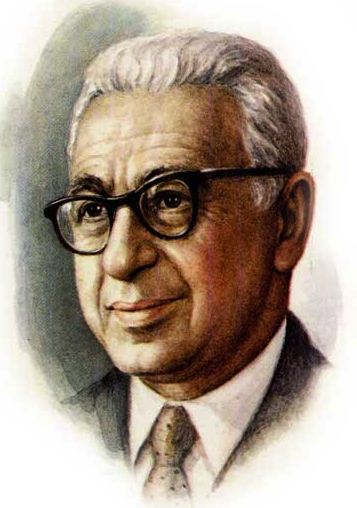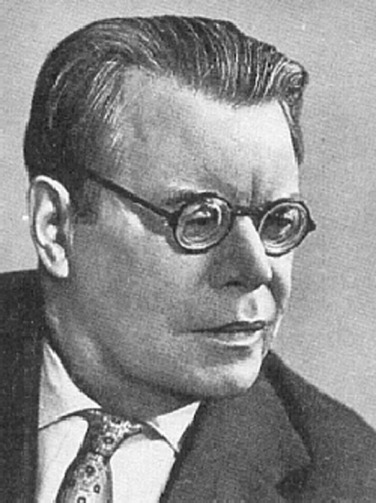Katyusha
English > Context > Propaganda > Katyusha
One of the most famous melodies from the musical propaganda of the Soviet Union is undoubtedly the song Катюша [Katyusha]. Many people - including Russians - think this song is from the old Russian folklore, but nothing is farther from the truth. The tune was written in 1938 as part of the propaganda machine of the Soviet Union which, in that time, was running at full capacity.
In 1936, the Комитет по делам искусств [Komitet po delam iskusstv] or Committee for Artistic Affairs, an institution directly reporting to the Sovnarkom, made the decision to establish the Государственный джаз-оркестр СССР [Gosudarstvenny dzhaz-orkestr SSSR] or the State Jazz Orchestra of the USSR. The orchestra got a typical Soviet abbreviation: it was called Госджаз [Gosdzhaz]. The artistic direction was entrusted to the composer Matvey Isaakovich Blanter (1903-1990), while conductor Viktor Nikolaevich Knushevitsky (1906-1972) was assigned to the function of musical director. The goal was to canalize the so-called массовая песня [massovaya pesnya] or mass song in the direction desired by the regime. To the vulgar jazz and pop music which was in vogue in the West, should be added a symphonic dimension. In the social mission of the orchestra was therefore specifically stated that the orchestra had to make symphonic jazz. Its music should be Симфоджаз [simfodzhaz].
Click here to read more about jazz music in the Soviet Union
On November 27, 1938, the Gosdzhaz had its first performance. It was in the Colonnade of the House of Unions, parodied by Bulgakov in Chapter 5 of The Master and Margarita as the Coliseum. And immediately the band made its social mission true. For the occasion, Matvey Blanter had written the song Катюша (Katyusha) on a text by the poet Mikhail Isakovsky (1900-1973). It was sung by Valentina Batishcheva that evening, and it was an instant success.
The song described the role of a soldier on the front, who had to fight to protect the Motherland, while his sweetheart Katyusha would ensure that their love was protected. Still today, the song is always performed on any celebration of Victory Day in Russia, every year on May 9.
In 1943, Felice Cascione (1918-1944) wrote an Italian text entitled Fischia il vento to the melody of Katyusha. In that version, the tune would become one of the most popular songs of the Italian partisans in World War II, along with Bella Ciao.
Casatchok
Perhaps you know the melody of Katyusha better as the Casatchok. That tune became extremely popular in Western Europe in 1968. In France, for example, the instrumental version of Dimitri Dourakine was at the number 1 position on the national charts for three months in the beginning of 1969. Dimitri Dourakine is not a Russian, as you may think, he's a dealer in musical instruments from Leuven, Belgium. His real name is Leo Caerts (°1931) and later, in 1971, he would release an even greater worldwide hit in the form of Eviva España. The name Dourakine comes from the Russian word Дурак [durak], which means fool or idiot. I do not know if that was a conscious choice.
Caerts had no idea of the origin of the song. He had taken the melody from the Bulgarian singer Boris Rubaschkin (°1932), who had departed far from the original text of Katyusha in 1967 when he released in under the title Ras dwa Casatschok. Rubaschkin had turned the song into some kind of Bavarian drinking song in which Katyusha was replaced by Petrushka, and the theme of the war was changed into the ambiance of vodka and balalaikas.
The title Casatchok is the French translitteration of the Russian word казачок [kazachok] or little Cossack, and was meant to suggest that the song was a contemporary version of an old and famous Russian Cossack dance. That's how arose the misconception that Katyusha would be a folk song from the ancient Russian folklore.
Later, many other singers like Rika Zaraï and Dalida would represent Rubaschkin's Casatchok as a folklore dance song and by doing so, deviate Katyusha further from its original meaning. Boris Rubaschkin himself strengthened this idea by using the Casatchok as the opening track on his compilation album Russische Volkslieder (Russian folk songs) in 1991.
Stalin's Organ
When the Second World War started, the song was still very popular. So popular that the soldiers of the Red Army soon would give the nickname Katyusha to their multi-rocket launchers BM-13, BM-8 and BM-31. The German soldiers however called them Stalin's Organs, because of their physical resemblance the pipes of an church organ.
Music
Katyusha - Valentina Batishcheva


